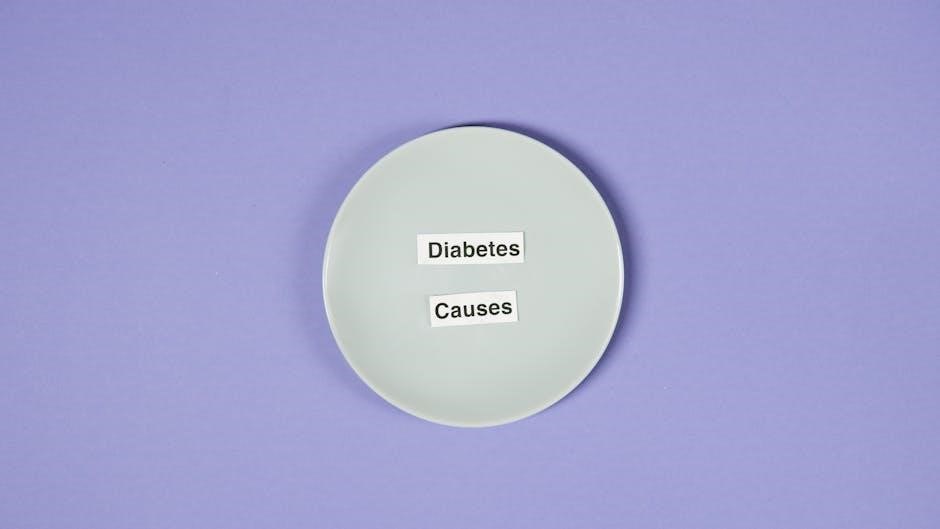Mandy’s Nutritional Information provides a comprehensive guide to healthy eating, offering insights into balanced diets, essential nutrients, and practical tips for improving overall wellbeing and preventing chronic diseases.
1.1 Overview of Mandy’s Nutritional Guide
Mandy’s Nutritional Guide is a detailed resource offering insights into healthy eating, balanced diets, and essential nutrients. It provides practical tips and strategies for improving overall wellbeing and preventing chronic diseases. The guide is structured to help individuals make informed food choices, emphasizing the importance of macronutrients, micronutrients, and mindful eating habits for long-term health benefits.
1.2 Importance of Understanding Nutritional Information
Understanding nutritional information is crucial for making informed diet choices, improving overall health, and preventing chronic diseases. It enables individuals to recognize the role of macronutrients and micronutrients, aiding in maintaining a balanced diet and enhancing mental and physical performance. Knowledge of nutrition empowers individuals to adopt healthier lifestyles and make sustainable, evidence-based decisions for long-term wellbeing.

Key Nutrients and Their Roles
Understanding key nutrients is essential for optimizing health, as they provide energy, support growth, and maintain bodily functions, ensuring overall wellbeing and proper diet balance.
2.1 Macronutrients: Carbohydrates, Proteins, and Fats
Macronutrients are essential for energy and bodily functions. Carbohydrates provide fuel for the brain and body, while proteins build and repair tissues. Fats support hormone production and absorption of vitamins, ensuring a balanced diet for optimal health and daily functioning.
2.2 Micronutrients: Vitamins and Minerals
Micronutrients, including vitamins and minerals, are crucial for maintaining bodily functions. They support immune health, nerve function, and energy production. Vitamins like C and D, along with minerals such as calcium and iron, are essential for overall health, preventing deficiencies, and promoting long-term wellbeing.
Health Benefits of Balanced Nutrition
A well-balanced diet enhances overall health, boosts energy levels, and supports immune function. It helps maintain a healthy weight, improves mental clarity, and reduces the risk of chronic diseases.
3.1 Improving Overall Wellbeing
A balanced diet plays a crucial role in enhancing overall wellbeing by providing essential nutrients that support physical health, mental clarity, and emotional stability. Proper nutrition helps maintain energy levels, strengthens the immune system, and promotes healthy skin and hair. By incorporating a variety of whole foods, individuals can experience improved health outcomes and a better quality of life.
3.2 Preventing Chronic Diseases
A well-balanced diet is key to preventing chronic diseases like heart disease, diabetes, and obesity. By limiting processed foods and focusing on whole grains, fruits, vegetables, and lean proteins, individuals can significantly reduce their risk. Healthy eating habits also contribute to maintaining a stable weight and lowering cholesterol and blood pressure levels, promoting long-term health and reducing the likelihood of developing chronic conditions.

Dietary Recommendations for Different Groups
Dietary needs vary across age and health conditions. Adults require balanced diets for maintenance, while children need nutrient-rich foods for growth. Special conditions demand tailored approaches.
4.1 Nutritional Needs for Adults
Adults require a balanced diet rich in essential nutrients to maintain health and energy. Emphasizing whole foods like fruits, vegetables, lean proteins, and whole grains supports optimal functioning. Adults should limit processed foods and sugars to prevent chronic diseases. Staying hydrated and monitoring portion sizes are also crucial for overall wellbeing and long-term health management.
4.2 Special Considerations for Children and Adolescents
Children and adolescents require tailored nutrition to support growth and development. Adequate calcium intake is crucial for bone health, while essential vitamins and minerals like iron and zinc promote energy levels and cognitive function. A varied diet rich in whole foods ensures proper development, helping them thrive physically and mentally during these critical growth stages.
Common Nutritional Myths and Facts
Mandy’s Nutritional Information separates fact from fiction, challenging popular diet myths and highlighting science-backed truths to help individuals make informed choices for a healthier lifestyle;
5.1 Debunking Popular Diet Myths
Mandy’s guide tackles common misconceptions, such as “low-fat means healthy” and “all carbs are bad,” providing evidence-based insights to dispel myths and empower individuals with accurate knowledge for better dietary decisions.
5.2 Evidence-Based Nutritional Advice
Mandy’s guide offers reliable, research-backed recommendations, emphasizing the importance of personalized nutrition, balanced macronutrient intake, and mindful eating habits to promote long-term health and wellness.

Sources of Reliable Nutritional Information
Mandy’s guide highlights trusted sources like official websites, academic journals, and established health organizations for accurate and science-backed dietary recommendations.
6.1 Trusted Websites and Organizations
Mandy’s guide recommends trusted sources like the World Health Organization (WHO), United States Department of Agriculture (USDA), and Centers for Disease Control and Prevention (CDC). These organizations provide evidence-based nutritional advice. Additionally, peer-reviewed journals and academic institutions are highlighted as reliable resources for accurate dietary information, ensuring readers access credible and up-to-date guidance for informed decision-making.
6.2 How to Identify Credible Sources
To ensure reliability, look for sources with peer-reviewed articles, academic affiliations, and established health organizations. Check for citations and avoid unverified claims. Reputable websites like WHO, USDA, and CDC are trustworthy. Be cautious of promotional content or lack of scientific backing. Verifying information through multiple sources enhances credibility, ensuring the nutritional advice is evidence-based and unbiased for informed decision-making.
The Impact of Nutrition on Mental Health
Nutrition significantly impacts mental health by influencing cognitive function and emotional states, with a balanced diet playing a crucial role in maintaining mental wellbeing.
7.1 The Gut-Brain Connection
The gut-brain connection highlights the relationship between the digestive system and mental health. A healthy gut microbiome produces neurotransmitters, influencing mood and cognitive function. Research shows that an imbalance, or dysbiosis, can contribute to anxiety and depression. A diet rich in fiber, fruits, and vegetables supports gut health, promoting mental wellbeing and emotional resilience.
7.2 Nutritional Strategies for Mental Wellbeing
Nutritional strategies for mental wellbeing emphasize whole, nutrient-dense foods like omega-3 rich fish, antioxidants, and whole grains. These foods support brain health by reducing inflammation and promoting neural function. Staying hydrated, limiting processed sugars, and incorporating probiotics also play crucial roles in maintaining mental clarity and emotional stability, as outlined in Mandy’s guide for optimal mental health.

Practical Tips for Healthy Eating
Plan balanced meals, create grocery lists, and practice portion control. Stay hydrated, eat mindfully, and avoid distractions during meals to foster healthier eating habits consistently.
8.1 Meal Planning and Grocery Shopping
Plan meals weekly to ensure balanced nutrition and reduce food waste. Create a grocery list with whole foods, fruits, and vegetables. Shop the perimeter of the store for fresh items. Avoid processed foods and sugary snacks. Stick to your list to stay on track. Incorporate seasonal produce for variety and cost savings. Stock your pantry with essentials like whole grains, beans, and spices for quick, healthy meals.
8.2 Mindful Eating Habits
Mindful eating involves paying full attention to the experience of eating. Savor each bite, recognize hunger cues, and practice portion control. Stay hydrated to avoid mistaking thirst for hunger. Avoid distractions like screens during meals. Listen to your body’s signals to stop when satisfied, not stuffed. Incorporate variety to keep meals enjoyable and reduce overeating driven by boredom or emotional triggers.
The Role of Nutrition in Physical Performance
Proper nutrition is essential for enhancing physical performance, supporting energy levels, endurance, and recovery. A balanced diet aids in muscle repair and optimizing overall athletic output.
9.1 Fueling for Sports and Exercise
Proper nutrition is vital for sports and exercise, providing energy and endurance. Carbohydrates are key for fuel, while proteins support muscle repair. Timing meals around workouts ensures optimal performance. Hydration is crucial to prevent fatigue. A balanced intake of nutrients, including electrolytes, helps maintain stamina and recovery. Personalized dietary plans can enhance specific athletic goals and overall physical performance effectively.
9.2 Recovery Nutrition
Recovery nutrition focuses on replenishing energy stores and repairing muscles post-exercise. Consuming a mix of carbohydrates and protein within 30-60 minutes after activity aids muscle recovery. Hydration is essential to restore fluid balance. Antioxidants and electrolytes help reduce muscle soreness. A balanced recovery meal supports immune function and prepares the body for future physical demands, ensuring optimal performance and overall health.
Future Trends in Nutritional Science
Future trends include personalized nutrition, genomics, and sustainable diets, focusing on tailored diets and eco-friendly practices to promote health and environmental sustainability.
10.1 Personalized Nutrition and Genomics
Personalized nutrition uses genomics to tailor diets based on genetic makeup, optimizing health outcomes. By analyzing DNA, individuals can identify nutrient needs, food intolerances, and health risks, enabling customized meal plans. This approach promotes better digestion, weight management, and disease prevention, making it a groundbreaking advancement in nutritional science.
10.2 Sustainable and Plant-Based Diets
Sustainable and plant-based diets focus on reducing environmental impact while promoting health. These diets emphasize whole, minimally processed foods, such as fruits, vegetables, and legumes, which lower greenhouse gas emissions and support biodiversity. Plant-based eating aligns with global health goals, offering benefits like improved heart health and weight management, making it a key trend in modern nutrition.
Mandy’s Nutritional Information provides a comprehensive guide to balanced eating. Prioritize nutrition for overall health and wellbeing. Apply these insights daily and inspire others to do the same.
11.1 Applying Nutritional Knowledge in Daily Life
Integrating Mandy’s nutritional insights into daily routines can significantly enhance health outcomes. Start by meal planning, grocery shopping for whole foods, and practicing mindful eating habits. Focus on portion control, hydration, and balanced meals. These simple yet effective strategies can lead to improved energy levels, better digestion, and a reduced risk of chronic diseases, fostering long-term wellbeing and resilience.
11.2 Encouraging Others to Prioritize Nutrition
Sharing nutritional knowledge with family and friends can inspire healthier choices. Lead by example, discuss the benefits of balanced diets, and create supportive environments for positive change. Encouraging mindful eating habits and providing resources like Mandy’s guide can empower others to take control of their health, fostering a culture of wellness and mutual support for long-term benefits.
